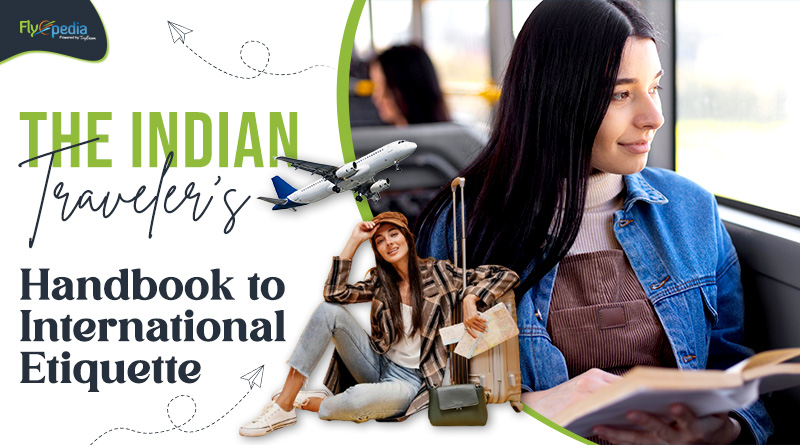The Indian Traveler’s Handbook to International Etiquette
Traveling is an exciting adventure that allows people to discover different cultures and take in breathtaking natural scenery. You can also have the opportunity to engage in cultural exchange and demonstrate your manners by traveling. However, there are occasional failures in etiquette due to the diversity and differences in customs and civilizations. Consequently, there are some fundamental travel etiquette guidelines that all travelers should follow to behave politely and respect locals. Thus, if you are an Indian traveling overseas, we are bringing you the Indian traveler’s handbook to international etiquette. Additionally, you can visit Flyopedia, the best online travel website to book air india direct flights to mumbai.
International Travel Etiquette Tips For Every Tourist
1. Make Sure to Do Your Research Beforehand
Cultural awareness is essential. Approach your travels with an open mind and an inquisitive mindset, eager to learn about new cultures. Examine the history, customs, and traditions of your intended location to learn more about the way of life there. You can find out about different cultures through literature, the internet, or talking to people who have been there.
By truly displaying curiosity, you can convey your respect and enthusiasm for the uniqueness of the culture you will encounter. Researching the culture of the country on your own is a great way to become more conscious of cultural diversity and prepare yourself for the differences you face.
2. Learn a Handful of Fundamental Regional Languages
In addition to learning the customs and language of the area, visitors should become proficient in some fundamental phrases like “hello,” “goodbye,” “pardon me,” etc. Even though English is widely spoken worldwide, knowing the local tongue will make visitors more amiable with the locals. It will not only make your stay easier, but the locals will also find it helpful. Of course, fluency in the local language is not a must for guests. It’s beneficial even to pick up a few basic terms.
3. Dress Accordingly
There are nations where the clothing code is more conservative, while others are more liberal. If the nation you are visiting has a conservative culture, consider that. Try to seem as much like a local as you can to indicate that you respect their dress code and for your safety. Additionally, you ought to show respect for the traditions and culture of the place you are visiting by dressing modestly.
4. Try to Be Open-Minded and Avoid Stereotypes
When visiting a new culture, you need to be open-minded and have some degree of cultural competency. Stereotypes based on culture and generalizations have the power to promote bias and lead to misunderstandings. Keep an open mind in all of your interactions and recognize that persons with diverse cultural backgrounds may have differing ideas.
Accept the differences you come across and recognize the value they provide to the human species as a whole. Additionally, it entails being open to learning new information and adopting new viewpoints. Another part of it is respecting the people and their customs, even if they are different from your own.
5. Be Observant of the Body Language
Body language is a valuable tool for interpersonal communication and is included in essential travel etiquette guidelines. However, bear in mind that depending on the nation you are visiting, gestures may be understood differently. It’s usually a good idea to remain silent and to use tactful language when asking or responding to questions. Furthermore, if you are looking to book flight tickets from USA to India, make sure to visit Flyopedia.
6. Consider the Place, Time, and People When You’re Taking Photographs
First and foremost, you must abide by the rules about photography at some tourist locations, particularly those that forbid it.
Second, get permission before snapping any images of locals, especially ones that show their faces clearly. If they don’t agree, it will be considered an infringement on their right to protect private images. Asking permission before taking any pictures is a great way for visitors to show their respect for the locals.
Thirdly, taking pictures of the artwork sometimes detracts from other visitors’ enjoyment of it and destroys it. Many cathedrals and museums, or at least some sections of them, prohibit photography because paintings cannot withstand being exposed to light from camera flashes every day for years on end. Visit India from Canada with cheap flight tickets on Flyopedia.ca
7. Tune Your Volume as Needed
Make sure you pay attention to the tone in every nation you visit. Above all, there are always going to be religious and spiritual sites; these are not the places to talk loudly, make phone calls, or laugh with friends.
Loud and boisterous sounds made in public are regarded as rude. When driving, you should talk at a low volume only. If you need to communicate with someone or get their attention, you should send a signal.
8. Maintain Cleanliness
Every visitor has an ongoing obligation to preserve the ecosystem. When visiting tourist sites that need it, you should make sure you follow waste classification requirements and dispose of your rubbish properly. By traveling in this manner, tourists not only get to see the splendor of another culture but also contribute to the preservation of the locations they visit and the surroundings in which they live.
Bottom Line
These are some common travel etiquette that you should try to follow when you travel abroad. Through cultivating a curious mindset, adapting to local customs, and engaging in sincere dialogues, we establish significance and transcend boundaries. These interactions teach us that despite our differences, our shared humanity binds us all together. So book Affordable Flight Tickets from USA to Goa with Flyopedia, travel with an open mind, and treasure the priceless teachings that every culture offers to our souls.
Also Read: Eating Etiquettes to Observe While Flying




